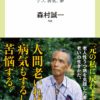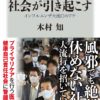
専門医
プロフィールによると、著者は4つの「専門医」で、一つの「認定医」であるそうです。これについては「知っているようで知らない」知識には述べられていませんが、多分認定制度があって、いくつもの資格をとっているということなんだろうと思います。資格があれば名乗っても問題はありませんが(例えば司法書士と公認会計士など)、「専門」という言葉はそれを名乗るのは「それに特化していて、その分野に秀でていますよ」という意味のように思います。
「感染症専門医」であり、通説や俗説を正すような内容である本書が「PCR陽性者」を「感染者」と呼ぶのはどうなのかなあ、と思います。(P.61)
だから、「実際には、感染している人でも、多くて3割は「陰性」になることがわかっています」(同)という、わかるようで、よくわからない表現になります。
医学は科学?
私は、医学を科学と呼ぶべきかどうかを迷っています。この本を読んで、その疑問がますます深くなりました。
確かに、医師が経験の職業でなくなりつつあるのは事実です。数値化され、マニュアル化されることが多くなっているので、極端なことを言えば「検査機器があれば技術はいらない」というようなことになるかもしれません。逆にマニュアル通りにやって、数字を尊重する、ということをしなければ「医療訴訟」に負けることにもなります。だから、最近の医者は聴診器もそこそこに「検査しましょう」といいます(患者も「検査もしてくれない」という不満を漏らします)。それで様々な検査をした挙げ句に「異常はありませんね」と言って患者を安心させます(あるいは不安にさせます)。
例えば、血圧が140あったら、きっと医者は「血圧が高い(高め)ですね」と言うでしょう。140(あるいは130)が基準ですから。でも、それは日本でのことで、国によって基準は異なります。日本でもつい最近までは160が基準でした。国や時代によって変わる基準は少なくとも「普遍的(ユニバーサル)」ではありません。
まあ、詳しいことは書くのが面倒になりました。血圧は、寝ているとき、走った後、緊張しているとき、好きな人にあったとき、歳をとったとき、など変化するもので、変化するのが正常な体の反応です。
体調が悪くなければけっして治療をする必要のないものだと私は自分に言い聞かせています。だから、「心配するために」健康診断を受けることはしません。
ほとんどの人が、学校で「点数付け」されることが嫌だったのではないですか。「成績(点数)がその人の価値を決めるわけじゃないよ」。私は、私の体を点数にしてほしくありません。
ところが、多くの人が「点数をつけてもらい」「判定(診断)」をしてもらうために病院に行きます。だから、「異常ありません」と言われると不安になります。「〜ですね。薬を出しておきます」と言われるとがっかりすると同時に安心します。薬を飲んでいればいいのですから。多くの人が薬を嚥んでいます。薬は・・・面倒になってきました。(^_^;)
トリビア
発音は「トリヴィア」ですね。「小ネタ」ぐらいの意味でしょうか。どの章もどの項目も面白いです。
ただ、「ものを書く人」、とくにマスコミ(メディア)等に従事する人は知っておいてもらいたい項目ばかりです。権威をもとに書いている人の影響力は大きいですから。
今の時代(「時期」とは言い切れない)、政府の方針や世論に反することは書きにくいです。でも、「医師」として「権威」を基に書くからこそ、「御用記事」になってはいけないと思います。
出版社も、「売れればいい」と思っていては「本を殺す」ことになると思います。自分を殺す勇気があるのであれば、未来の日本(世界)を「守る」勇気のほうが大切なのではないでしょうか。
⟨impressions⟩
Specialist
According to the profile, the author is four "specialists" and one "certified doctor". This isn't mentioned in the "know but don't know" knowledge, but I think it's probably because there is a certification system and you have a number of qualifications. It's okay to give your name if you have the qualifications (for example, a scrivener and a certified accountant), but the word "specialty" means "specialize in it and excel in that field." I think like that.
I wonder how this book, which is an "infectious disease specialist" and corrects popular and popular theories, calls "PCR-positive people" "infected people". (P.61)
So, it seems to be understandable and unclear, saying, "In fact, even people who are infected know that at most 30% will be" negative "" (same as above). ..
Is medicine a science?
I'm wondering if medicine should be called science. After reading this book, the question became deeper and deeper.
It is true that doctors are no longer an experienced profession. Since it is often quantified and made into a manual, in the extreme case, it may be something like "If you have inspection equipment, you don't need technology." On the contrary, if you do not follow the manual and respect the numbers, you will lose the "medical proceedings". That's why doctors these days say that stethoscopes should be "tested" (patients also complain that they won't test). Therefore, the patient is relieved (or anxious) by saying "There is no abnormality" in the phrase after various tests.
For example, if you have a blood pressure of 140, your doctor will probably say, "Your blood pressure is high (high)." Because 140 (or 130) is the standard. But that is in Japan, and the standards differ from country to country. Until recently, 160 was the standard in Japan as well. Standards that change from country to time are not at least "universal."
Well, it's a hassle to write the details. Blood pressure changes when you sleep, run, when you are nervous, when you meet someone you like, when you get older, and so on, and it is the normal reaction of your body to change.
I'm telling myself that if I'm not feeling well, I never need to be treated. That's why I don't get a medical examination "to worry".
Most people didn't like being "scored" at school. "Grades (scores) do not determine a person's value." I don't want my body to be scored.
However, many people go to the hospital to get a score and a judgment (diagnosis). Therefore, I am worried when I am told that there is nothing wrong with it. I'm disappointed and relieved when I'm told, "I'll give you some medicine." All you have to do is take the medicine. Many people are taking medicine. The medicine ... has become troublesome. (^ _ ^;)
Trivia
The pronunciation is "trivia", isn't it? Does it mean something like "small story"? Every chapter and every item is interesting.
However, "people who write things", especially those who are engaged in the media (media), etc., are all items that I would like you to know. The influence of those who write based on authority is great.
In this era (which cannot be called "time"), it is difficult to write anything that goes against government policy or public opinion. However, I don't think it should be an "article" because it is written based on "authority" as a "doctor".
I think publishers will "kill books" if they think "it should sell". If you have the courage to kill yourself, the courage to "protect" Japan (the world) in the future is more important.
[著者等(プロフィール)]
二〇一〇年京都大学医学部卒業。市中病院勤務を経て、現在京都大学大学院医学研究科、消化管外科。外科専門医、消化器病専門医、消化器外科専門医、感染症専門医、がん治療認定医など。「外科医けいゆう」のペンネームで医療情報サイト「外科医の視点」を運営。Yahoo! ニュース、時事メディカルなどのウェブメディアで定期連載。全国各地でボランティア講演なども精力的に行っている。著書に『医者が教える 正しい病院のかかり方』(幻冬舎新書)、『患者の心得 高齢者とその家族が病院に行く前に知っておくこと』(時事通信社)ほか。
意識不明の重体。全治3カ月の怪我。ニュースや小説・ドラマによく登場する表現だが、「意識不明」も「全治」も実は医者はほとんど使わない。逆に「清潔・不潔」を医学用語として使うと白衣は「不潔」なもの、「がん」と「癌」も意味が違う。このような言葉をめぐる行き違いは、ときに医者との関係がギクシャクする原因になる。本書ではこれら「誤解の素」になる言葉をやさしく解説。医者の話がよく分かるようになり、ドラマ・小説はより面白くなり、人体の仕組みや病気のなりたちについても理解が深まる一冊。


